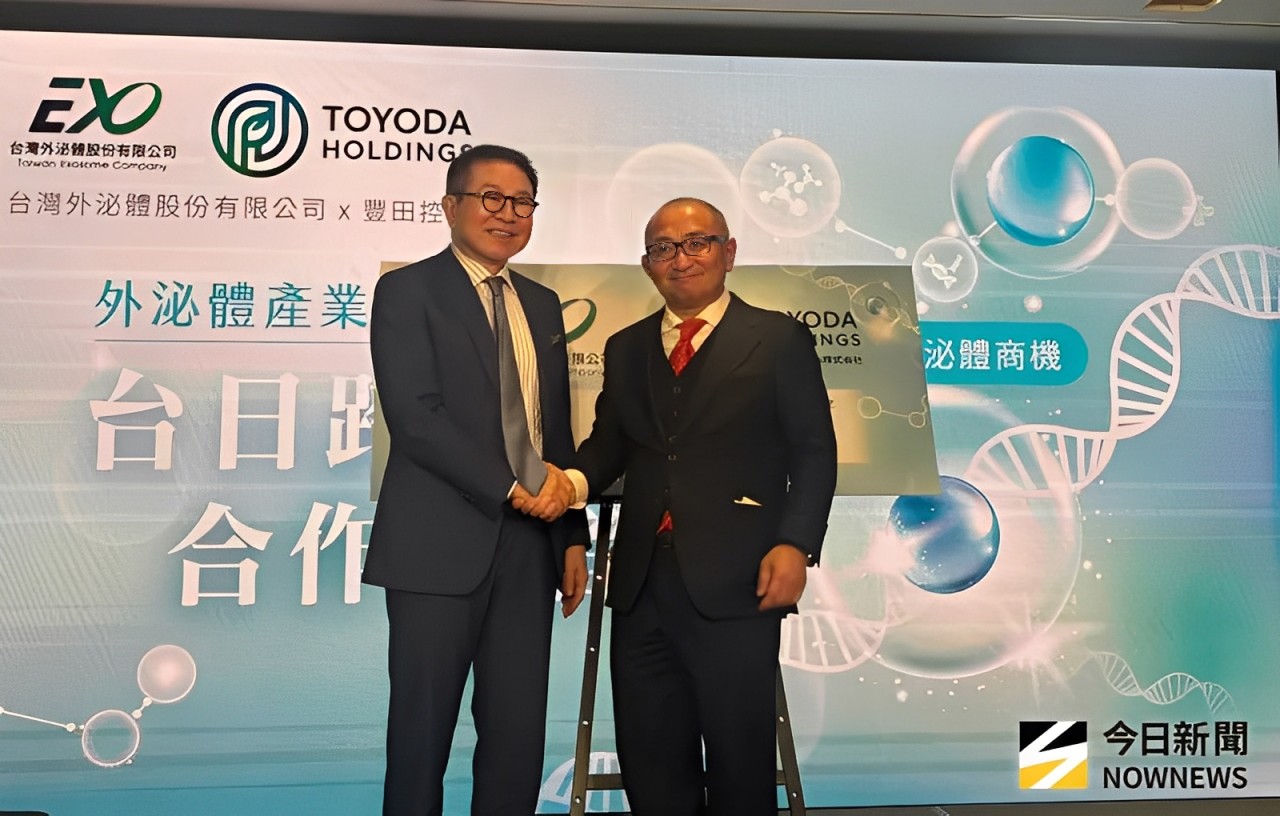2025/10/15
Editorial Column
Taiwanese Exosome Company Partners with Toyota Holdings to Promote Exosomes; Legislator Calls for the Creation of an 'Exosome Shield

▲Chairman Hung Chi-Chang of Taiwan Exosome Company (left) and Hiroyuki Toyota, President of Japan's Toyota Holdings (right), jointly established "Japan Exosome Corporation," initiating cross-border cooperation to create a new generation Asian biotech alliance. (Photo / Reporter Li Qingying)
The global biotech industry is experiencing a "visible explosive wave," and exosome technology has been hailed as "the next AI industry." Taiwan Exosome Company (TEC) and the century-old Toyota Holdings jointly established "Japan Exosome Corporation," launching cross-border cooperation to build a new generation Asian biotech alliance.
According to international research institutions, the global exosome market reached USD 4.58 billion in 2024 and is expected to grow to USD 24.1 billion by 2034, with a compound annual growth rate of 18.3%. Market analysts believe exosomes will become the most valuable emerging industry to invest in after AI. Last year, Taiwan's biotech output exceeded TWD 1.47 trillion, a record high. For investors, this collaboration is not only a stage for medical technology innovation but also a driver for the "new biotech blue ocean."
Taiwan Exosome Company is the country's "first" NK cell production facility certified by the Ministry of Health and Welfare FDA, with three major process advantages: "immune cell therapeutics, exosome R&D, and academic-medical clinical validation." Its research covers clinical fields including cancer, autoimmune diseases, neurodegeneration, and anti-aging. Chairman Hung Chi-Chang stated that Taiwan has policy support, R&D capabilities, and international cooperation advantages, while Japan has a strong medical foundation. The Taiwan-Japan alliance aims to take a leading position on the international biomedical capital stage.
Hiroyuki Toyota, President of Toyota Holdings, Japan, said that while Toyota is widely known for its automotive industry, "stability is not our goal; innovation is what comes next. I have been thinking about what we can leave for the next hundred years—the answer is here." He encountered revolutionary exosome technology in Taiwan and will become a growth partner with TEC. In the future, specialized clinics will be established across Japan, starting from Kumamoto.
Japan Exosome Corporation (日本エクソソーム株式会社) officially completed registration in Japan on July 9, 2025. It will develop the local market, provide clinical-grade cell products and healthcare applications to medical institutions, and use Japan as a hub to expand into Europe, the US, and Southeast Asia, promoting Taiwan’s superior exosome biomedical technology worldwide.
Legislator Chiu Chih-wei stated that a healthy Taiwan is an important presidential agenda, and exosomes will play a key driving role. He hopes that exosomes will not only shine in the biotech industry but also serve as a protective "exosome shield" for Taiwan. He also pledged to urge the Ministry of Economic Affairs to provide concrete measures and relax regulations so the industry can immediately benefit.
The global biotech industry is experiencing a "visible explosive wave," and exosome technology has been hailed as "the next AI industry." Taiwan Exosome Company (TEC) and the century-old Toyota Holdings jointly established "Japan Exosome Corporation," launching cross-border cooperation to build a new generation Asian biotech alliance.
According to international research institutions, the global exosome market reached USD 4.58 billion in 2024 and is expected to grow to USD 24.1 billion by 2034, with a compound annual growth rate of 18.3%. Market analysts believe exosomes will become the most valuable emerging industry to invest in after AI. Last year, Taiwan's biotech output exceeded TWD 1.47 trillion, a record high. For investors, this collaboration is not only a stage for medical technology innovation but also a driver for the "new biotech blue ocean."
Taiwan Exosome Company is the country's "first" NK cell production facility certified by the Ministry of Health and Welfare FDA, with three major process advantages: "immune cell therapeutics, exosome R&D, and academic-medical clinical validation." Its research covers clinical fields including cancer, autoimmune diseases, neurodegeneration, and anti-aging. Chairman Hung Chi-Chang stated that Taiwan has policy support, R&D capabilities, and international cooperation advantages, while Japan has a strong medical foundation. The Taiwan-Japan alliance aims to take a leading position on the international biomedical capital stage.
Hiroyuki Toyota, President of Toyota Holdings, Japan, said that while Toyota is widely known for its automotive industry, "stability is not our goal; innovation is what comes next. I have been thinking about what we can leave for the next hundred years—the answer is here." He encountered revolutionary exosome technology in Taiwan and will become a growth partner with TEC. In the future, specialized clinics will be established across Japan, starting from Kumamoto.
Japan Exosome Corporation (日本エクソソーム株式会社) officially completed registration in Japan on July 9, 2025. It will develop the local market, provide clinical-grade cell products and healthcare applications to medical institutions, and use Japan as a hub to expand into Europe, the US, and Southeast Asia, promoting Taiwan’s superior exosome biomedical technology worldwide.
Legislator Chiu Chih-wei stated that a healthy Taiwan is an important presidential agenda, and exosomes will play a key driving role. He hopes that exosomes will not only shine in the biotech industry but also serve as a protective "exosome shield" for Taiwan. He also pledged to urge the Ministry of Economic Affairs to provide concrete measures and relax regulations so the industry can immediately benefit.
